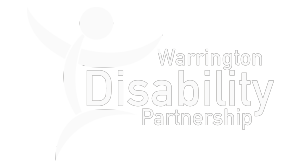Personal Health Budgets
WDP is working in partnership with NHS Warrington Clinical Commissioning Group and Disability Positive , promoting the use of Personal Health Budgets. A Personal Health Budget (PHB) is an amount of money to support a person’s identified health and wellbeing needs, which is planned and agreed between the person, their representative, or in the case of children, their families and the CCG. It is NOT new money but it is money that would normally have been spent by the NHS on the person’s care, used more flexibly to meet their identified health needs. Having a PHB does NOT affect the money you get from any benefits you receive. By receiving a PHB, you can have more choice and control over how and when your care is delivered and who helps you with your care.
If you have a PHB, you will be able to use it for a range of things to help you meet your health and wellbeing goals, for example therapies, personal care and equipment. You will not be able to pay for emergency hospital care and care you normally get from a GP. You are also not allowed to spend the money on gambling, debt repayment, alcohol or tobacco, or anything unlawful.
Warrington’s Local Offer
Adults who are eligible for NHS Continuing Healthcare (CHC) and children and young people eligible for NHS Continuing Care (CC) are entitled to a PHB. For children and young people (birth to 25) with special educational needs and disabilities (SEND), the PHB is likely to form part of their Personal Budget for their Education, Health and Care (EHC) Plan.
Joint funded support and budgets for individuals that are eligible for both CCG and Social Care (Local Authority) funding. Warrington CCG is currently piloting offering PHBs for End of Life Care, for individuals in their last few weeks of life, through the Fast Track process.
What is a support plan?
A support plan sets out how you will use your personal health budget and must cover the following:
- The health and wellbeing outcomes you want to achieve
- How your outcomes will be achieved
- The risks to your health, wellbeing, safety and independence
- How you will manage your personal health budget
- Contingency arrangements should support arrangements fail
Your support plan and budget need to be approved by the Clinical Commissioning Group (CCG) before your budget can be spent. Your support manager will help you with this. The CCG will decide whether there is sufficient money in your personal health budget to pay for all the support and services outlined in your support plan. Everything in your support plan must be lawful and comply with Department of Health guidelines. Once your care plan is approved, you can then buy or arrange the services you need.
How much money will I receive?
That depends on your needs. Once your personal health budget is confirmed you will have a regular review to look at whether your health and wellbeing outcomes are being met. Depending on the way you receive your money, the management of it will also be reviewed to make sure it is being spent on those things identified in your support plan. A personal health budget can take three forms:
- Notional budget - No money changes hands. You find out how much money is available and talk to your doctor or care manager about the different ways to spend that money on meeting your needs. They will then arrange the agreed care
- Real budget held by a third party - A different organisation or trust holds the money for you, helps you decide what you need and then buys the services you have chosen
- Direct payment - You get the cash to buy the services you and your doctor or care manager decide you need. You have to show what you have spent it on, and keep records of your spending, but you buy and manage services yourself. A personal health budget is not the same as a direct payment
What if my personal health budget runs out? Can I top it up with my own money?
Your personal health budget is calculated annually on the basis of your specific needs. You cannot top it up with your own money. If you wish to spend your own money on extra services however, (i.e. massage or more physiotherapy than your doctor thinks is necessary to improve your health) you can do this. You would need to organise and pay for this yourself, and it would be separate to your personal health budget.
Key points about PHBs
- NHS values still hold – no one will pay their own money to get the services they need or be denied essential treatment as a result of having a personal health budget
- Having a personal health budget does not entitle someone to more services, more expensive services, or preferential access to NHS services
- PHBs aren’t means tested. If the CCG approves your PHB, everything in the plan that helps achieve an agreed health outcome will be fully funded by the NHS
- Services should be safe and effective. Using them should be a positive experience
- PHBs should help people get a service from the NHS that best suits them
- The individual should have as much control over decisions as appropriate. Support is available for people to enable them to make choices and decisions regarding their health and wellbeing
- No one will have to get their services through a PHB if they do not want to
More Information
For more information about PHB’s please ring WDP on 01925 240064 and ask for Lorraine Scott, Care and Support Advisor or email them.



